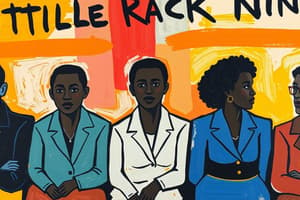Podcast
Questions and Answers
What event led to resistance from the South and created explosive racial tensions?
What event led to resistance from the South and created explosive racial tensions?
- Eisenhower's invitation to Governor Faubus
- Dwight D. Eisenhower becoming President
- The Little Rock Nine integrating Central High School
- Brown v. Board of Education ruling (correct)
Where did the Little Rock Nine attempt to integrate?
Where did the Little Rock Nine attempt to integrate?
- Little Rock, Kansas
- Little Rock, Missouri
- Abilene, Arkansas
- Central High School (correct)
Which military unit was deployed to uphold the law and protect the students at Central High School?
Which military unit was deployed to uphold the law and protect the students at Central High School?
- 101st Airborne (correct)
- United States Marine Corps
- National Police Force
- Arkansas National Guard
What did Governor Orville Faubus order the Arkansas National Guard to do?
What did Governor Orville Faubus order the Arkansas National Guard to do?
What did Eisenhower's actions during the Little Rock crisis demonstrate to other states?
What did Eisenhower's actions during the Little Rock crisis demonstrate to other states?
What impact did the ruling in Brown v. Board of Education have on segregation in education?
What impact did the ruling in Brown v. Board of Education have on segregation in education?
Where did Dwight D. Eisenhower grow up?
Where did Dwight D. Eisenhower grow up?
What was the significance of Eisenhower's invitation to Governor Faubus to discuss a solution?
What was the significance of Eisenhower's invitation to Governor Faubus to discuss a solution?
Flashcards are hidden until you start studying
Study Notes
- Dwight D. Eisenhower becomes President of the United States in the mid-1950s, during a period of post-World War II confidence and economic growth.
- Eisenhower grew up in Abilene, Kansas, and had no black friends or experience with racial issues.
- Brown v. Board of Education (1954) rules that segregation in education is unconstitutional, leading to resistance from the South and creating explosive racial tensions.
- In 1957, at the town of Little Rock, Arkansas, nine black students (the Little Rock Nine) are selected to integrate Central High School, but are prevented from attending by a white mob.
- Governor Orville Faubus of Arkansas orders the Arkansas National Guard to prevent the students from attending, escalating the crisis.
- Eisenhower invites Faubus to Newport to discuss a solution, but Faubus refuses to back down, leading Eisenhower to send in the 101st Airborne to enforce the law and integrate the school.
- The 101st Airborne, a renowned military unit that liberated Europe during World War II, is deployed to Little Rock to uphold the law and protect the students.
- The students, now with the support of the federal government, are able to attend Central High School, marking a significant victory for the civil rights movement.
- Eisenhower's actions send a message to other states attempting to defy the federal government, preserving the union and upholding the law.
Studying That Suits You
Use AI to generate personalized quizzes and flashcards to suit your learning preferences.




